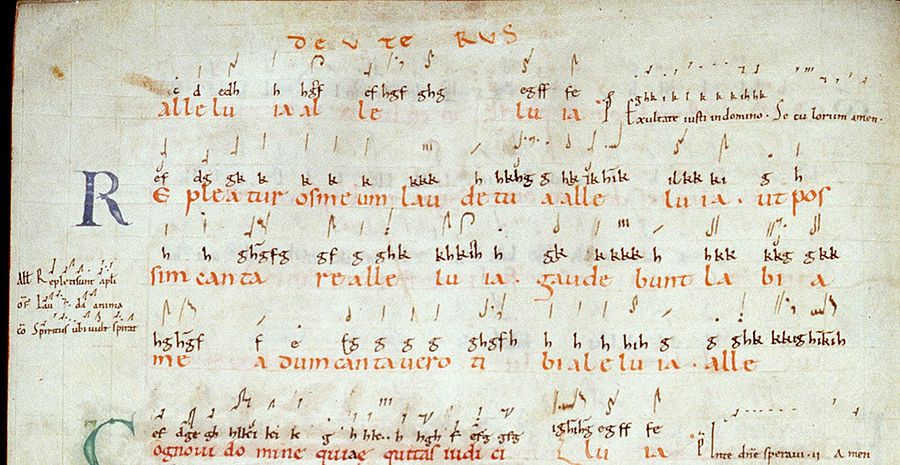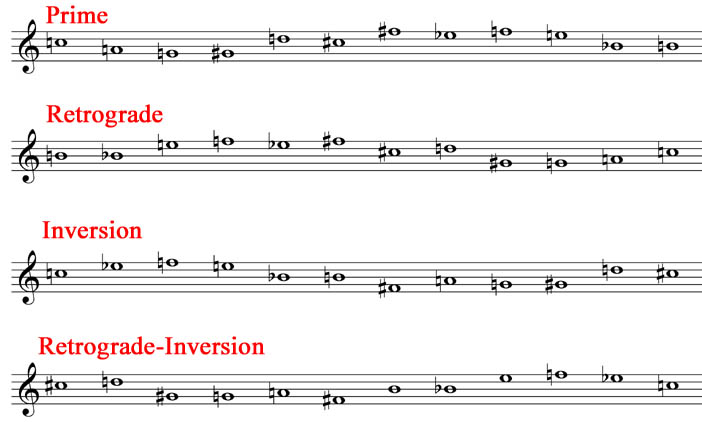I am working with composition as a kind of ecosystem, and one of the central aspects of this approach is to regard the musical score as a kind of DNA. In the musical score, the notes are the code to be interpreted or translated by the musician into sounding music. This music is what the community around the music need to thrive. In the living cell, the DNA is the code for the living organism, which, once translated or interpreted, form proteins that the organism need to persevere.
From this perspective, music and organic life is basically about scripture, interpretation and communication. Genetics and musical composition have these things in common, and when I compose, I take this connection a step further, you might say, and work specifically with musical expression in a way that is parallel to how living organisms interact with eachother and the environment.
Read more about my approach in this blogpost: “Music as an ecosystem“.
Of course, the fact of setting up this relation is purely cultural. It is a product of human activity through and through. In any case, science itself can be said to be a cultural phenomenon. At least, this idea about a cultural connection between genetics and composition makes me want to ask the question if there is a deeper connection, in cultural/scientific history between these to fields.
Music as a representation of genetic data
My initial research brought a rather big amount of results where musical composition is used as a means to illustrate or conceptualise genetic code.
In 1986, a japanese scientist, Susumu Ohno translated genetic code, with the help from his wife, a professional singer, into musical scores.
As you can hear, the result is a rather conventionally sounding piece in a kind of classical style.
Ohno’s experiments are described in this article: “The Ohnos and Genetic Music”, where the author, genetics professor Manuel Ruiz Rejon also mentions other examples of a musical representation of genetic codes, that are more elaborated. The basic idea is, as I understand it, to make an auditive representation of data. In this case genetic code. The thing about genetic code is, that it implies a lot of repetition. The same can be said about (certain types) of music. What these scientists have done is to represent genetic code data in sound, thus “combining this type of tool, which works “by ear” with existing visual and analytical tools to study the nucleotide sequences of genes and genomes found in the enormous databases that are currently available, where the main difficulty is to sort and make sense of them.” I did something similar, 9 months ago, when I explored how the occurence of prime numbers might sound.
In science, the most common way of representation is through visual means, and I think it makes sense to ask what we might miss? In fact, I can’t help thinking what would happen if we used sound as a means of representation in working with scientific facts.
Composition as a prerequisite for thinking genetic code
I’ve looked a little at how musical composition has been used to illustrate genetic code. How about the other way around? To which degree can it be said, that the development of the pentagram, ie. the Western representation of musical sounds in writing, might have contributed to the idea of code in living organisms?
After an initial search, I came to realize, that this is not an easy question to answer. I started by checking out who actually ‘discovered’ genetic code, and if these persons might have had some sort of epiphany by thinking musical composition. Or maybe they simply had had a musical upbringing. I had to rapidly discard this thought as too far fetched.
In order to answer the question about a possible relationship between the music notation and the ‘discovery’ of the DNA code, it makes sense to look for their respective roots.
The roots of the notational system
How did the notational system come into being in the first place? What were the prerequisites? What kind of thinking, what epistemology was needed for it to be conceived?
Well, musical notation seems to have been developed out of a necessity in the Church to streamline musical practises over large geographic distances. Put in the words of Wikipedia: “Christian monks developed the first forms of modern European musical notation in order to standardize liturgy throughout the worldwide Church”.
It also seem that musical notation was closely linked to written text, where some extra symbols, originally, were added to the text of the songs used in liturgy. I think that the close relationship to written text accounts for the left-to-right linearity of the musical score. Actually, it might be argued that music is not necessarily linear.

When I use one of my compositions as a ‘map’ for improvisation, I ‘read’ the score non-linearly; I jump from one ‘musical event’ to the other without regard to where they are in the score’s temporal logic.
In addition, it is certain, that some basic mathematical principles had to be in place before the notational system as we know it could be developed. To take one example, the idea of a fraction is behind the way that we divide the composition into bars, the bar into beats, and the beat into quarters, eights, etc., and triplets, quintuplets and so on.
The musical score has made it possible, similar to written text, to store and manipulate musical thinking in a non-temporal medium. Life is an ongoing, temporal process. The DNA is a way of conceptualising this process in a non-temporal manner. Is this a possible link?
The roots of the discovery of DNA code
What were the prerequisites for discovering DNA code? What technological development was needed? What kind of thinking, what epistemology was needed for it to be conceived?
These are, you might say, really heavy weight questions, that I am not at all in a position to answer; my guess is, that research in the line of Science and Technology Studies (STS), in the style of Bruno Latour and others would be an interesting place to look for answers. In other words, people who research into science with the assumption that they are not only looking into something which is (also) a cultural phenomenon.
Coming to understand the genealogy of the musical notational system seems much more straightforward than the genealogy of genetic science. This still doesn’t answer the question about a possible connection.
Since going for a directly observable connection has proven, as I have mentioned in the beginning of this blogpost, to be a complete failure, how would it be possible to answer this question?
I think it would require that we take quite a few steps backwards, in order to look at the musical notational system in a broader cultural-technical perspective. And ask if there might have been, throughout history, examples of a cultural environment, where the explorations into what kinds of thinking the musical notational system might offer, and how these kinds of thinking might have influenced thinking within the realm of natural sciences.
A possible place to look, I think, would be in the periods of time, where composers and scientists engaged in exploring and experimenting in their respective fields, interacted somehow, and exchanged ideas. Where composers explored and experimented with the possibilities offered by the musical score, in conjunction with the cultural-technological developments in musical instruments, and the the interaction between composer and his/her public, and society in a broader sense. And where natural scientists, for their part, explored their field, while taking advantage of the cultural-technological developments of the time, and – of course – the interaction with society in a broader sense.
Which periods to look into?
Even though we, in our time, have environments, where specialists of all kinds explore their own field to a detail, which in a historical perspective must seem extreme, I am not sure that own time is the best place to look for the kind of connection I am looking for. The problem is, I think, that artists, and scientists, and other specialists in our time, are too deeply dedicated to the intricacies of their little field of specialty, and that it takes too much knowledge about what others are into, in order to start to see possible connections between the fields.
What does these thoughts make you think of? Am I wrong if I say “the Renaissance man”? You know, the Leonardo da Vinci type of person?
Actually, I am thinking about two other historical periods/places. My knowledge is primarily as a composer, and from this perspective, I come to think of two historical places/periods, where musical composition were taking radically new places. One is the socalled Enlightnment (roughly 1750-1815, according to this article). My first place to look would be into Beethoven, and the environment where his musical thinking was nurtured and influential.
A rapid search online gave this result: A book about the concept of heredity, where one of the central points is, that “the concept of heredity came of age during the Enlightenment”. This makes sense, in a political sense, since it was a time where people started to question the idea, that certain people, ie kings, nobles etc., were born with certain privileges. The German composer Ludvig van Beethoven (1770 – 1827) was very preoccupied with these questions.
“Freedom and progress are our true aim in the world of art, just as in the great creation at large.” Beethoven, in a personal letter (source, cited here).
The other time and place would be Vienna in the beginning of the 20th century. Here, the music of Schoenberg and his pupils would be the place to start. A central characteristic of this school was the concept of dodecaphony, ie, the use of all twelve halfnotes in the musical system, each in their own right. Dodecaphony is an early example of what has become known as serialism, where the idea that musical parameters can be broken down into discreet entities, ie numbers (for rhythm and pitch), and terms (for dynamics, timbre etc), and that these entities can be combined in various ways, that are not necessarily fitting within the general idea of what music is supposed to sound like. This way of thinking music is, I would argue, very similar to the way of thinking needed to work with genetics, where discreet elements, ie aminoacids etc., are combined en various ways in order to generate different kinds of organisms.

The Enlightenment and early 20th century Vienna, would, I think, be two fruitful places to look for a crossover effects between musical composition and life sciences. In musicology, by the way, these two periods/places are being referred to as the first respectively second Viennese School. What happened in these places/times within the field of genetics? Well, maybe some of you have an answer, out there?
While you are thinking about these questions, I would like to invite you to listen to one of my latest improvisations, “Epilogue #0113000”; it is a (‘genetic’) spinoff of the composition “Last Dream” (#000000*)
* I use the hexadecimal system used for colors to name my compositions/improvisations. Read more about this in my blogpost here.
One thought on “Has musical composition influenced the discovery of the DNA?”